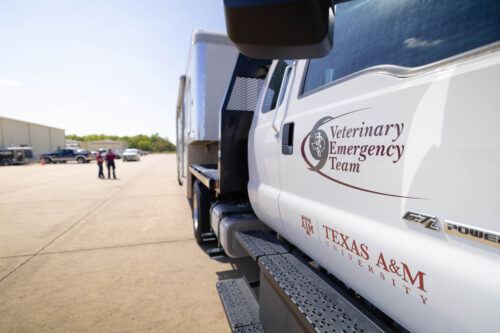Texas A&M Veterinary Emergency Team Mobilized for Hurricane Response in North Carolina
The Texas A&M Veterinary Emergency Team (VET) was deployed on Oct. 2 by the Texas Division of Emergency Management (TDEM) at the direction of Texas Gov. Greg Abbott in response to Hurricane Helene — which already ranks in the top 10 deadliest storms in U.S. history and is now the deadliest in North Carolina history — as search efforts continue.
Helene gutted Southern states on the East Coast, but the death toll has been highest in North Carolina, where VET members will play a vital role in supporting search and rescue dogs.
“Working dogs play a critical role in the aftermath of disasters of this scale,” said Dr. Deb Zoran, VET director. “Our job is to make sure these highly trained dogs are in healthy, working condition — even as they search in areas with hazardous debris, rough terrain and flood waters.
The Texas A&M College of Veterinary Medicine and Biomedical Sciences has supported the Texas A&M Task Force 1 Urban Search & Rescue (USAR) team since it was formed in 1997. Zoran was among the first veterinarians to support the team’s working dogs, making the VET uniquely qualified to provide the care working dogs require.
“Working dogs are highly specialized athletes,” Zoran said. “Part of our job as their veterinarians on deployment is to make sure their senses stay sharp, that they are appropriately hydrated, and that they are properly protected from the potential, often hidden dangers associated with doing their jobs.”
The VET will also utilize the most advanced decontamination methods for the working dogs, which is an important part of keeping both the dogs and their handlers safe while working in areas affected by natural disasters.
“Flood waters and landslide areas left behind by disasters like Hurricane Helene are exceptionally dangerous to human and animal health,” Zoran said. “We work with the dog handlers to decontaminate the dogs in the field as they work and again when they return to the base of operations.”
In addition to deploying 12 VET members, the team is also accompanied by Texas A&M AgriLife Extension Service’s Disaster Assessment and Recovery (DAR) agents.
“Disasters are devastating and require response teams to work together to help those in need,” Zoran said. “We are thankful to have logistics support from our fellow Texas A&M Aggies and DAR agents.”
This is the VET’s second deployment to the East Coast in response to a powerful hurricane, fourth out-of-state response, and first deployment to North Carolina.
“No matter where a disaster strikes, there are always people and animals in need,” Zoran said. “It’s an honor to be part of the response efforts to help communities in need across the United States.”

